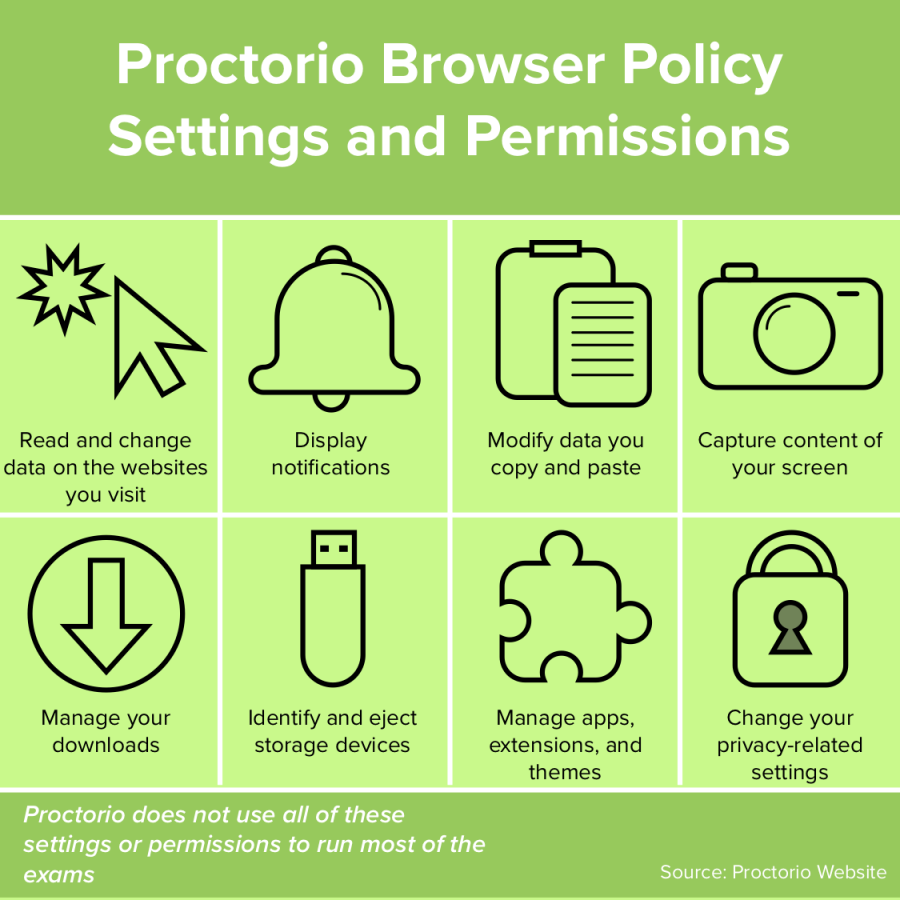Students petition to ban Proctorio amid privacy concerns
Oct 12, 2020
A petition with over 700 signatures is circulating to call upon the University to stop using Proctorio, an AI-based online proctoring system that analyzes trends to prevent students from cheating during tests.
Downloaded through Google Chrome, Proctorio requires the webcam and microphone to be turned on during testing, so it can track eye and head movements to look for signs of cheating. The platform can also view and capture content from the student’s screen, in addition to accessing the student’s downloads and privacy-related settings.
Sameer Khan, junior in LAS, created the petition on Sept. 30, advocating for the University to stop using Proctorio. This all started after Khan realized his midterm for ECON 203: Economics Statistics II would be proctored.
“I had heard some negative things about Proctorio, so I jumped down a rabbit hole of researching Proctorio, and to my dismay, I found that they pulled a lot of data from one’s computer,” Khan said.
For his midterm, Khan used a spare laptop because he didn’t feel comfortable using his own.
Get The Daily Illini in your inbox!
Khan suggests alternative proctoring methods to monitor cheating, such as using Zoom, to make sure students are not collaborating on tests.
Khan also suggested changing the structure of exams to make them more conceptual and run on the honor system.
“I think more exams should move in that direction, where we’re not forced to memorize redundant facts,” Khan said. “But they should in fact be more conceptual and more hands-on so that what we’re doing in exams is more practical, and we’re truly testing our knowledge.”
Kevin Pitts, Vice Provost for Undergraduate Education, agrees that the University wants to try and assess what students have learned rather than just assess their memory.
However, “there is no one size fits all when it comes to assessments,” Pitts said.
The move by the University to use Proctorio was an attempt to prevent students from gaming the system and instead level the playing field, according to Pitts.
Because the University moved very quickly to remote instruction in March, they needed some kind of proctoring mechanism relatively fast.
“It was always meant to be kind of a short term thing,” Pitts said.
According to Pitts, the University explored several online proctoring services before ultimately settling on Proctorio, which the University could act on quickly.
“These are the kinds of things that normally take months and months of contractual negotiations,” Pitts said.
Because Proctorio is an AI-based company, Procotorio would be able to meet the University’s level of demand, as opposed to other platforms such as ProctorU, in which humans monitor students in real-time.
According to Pitts, the University did a “full vetting” of Proctorio, working with Technology Services to make sure they were happy with how Proctorio was handling data.
“We’ve been keenly aware of (privacy issues) for some time because we’ve been using online proctoring in our fully online courses for some time,” Pitts said, referring to the use of other platforms such as ProctorU and Computer-Based Testing Facility.
The University has a contract with Proctorio which includes what the company is allowed to do with the data, such as who can have access to it and under what circumstances.
Pitts said Proctorio’s allowed use of the data is “extremely limited” because Proctorio adheres to the Family Educational Rights and Privacy Act. This is a Federal law that protects the privacy of student education records.
The University is evaluating Proctorio through feedback received from professors and students.






